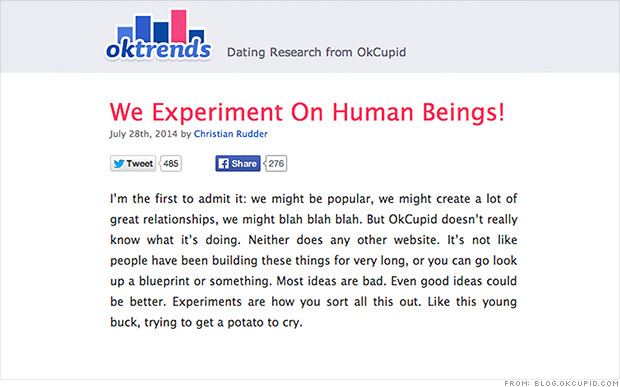Just weeks after Facebook came under fire for its emotion-manipulation study, the popular dating site, OkCupid, defended the experiment saying, "That's how websites work." Plus, it revealed that OkCupid, too, has dabbled in user manipulation for the sake of research.
Last month, an article in the Proceedings of the National Academy of Sciences revealed that Facebook manipulated the timelines of about 700,000 users in an attempt to study "emotional contagion through social networks." The study, which was conducted by Facebook, Cornell and the University of California-San Francisco, tested whether flooding a person's timeline with negative messages would cause that person to post more negative updates of their own.
Recently, OkCupid admitted to participating in emotional experiments when it was revealed that the site has previously manipulated the information that users recieve about potential matches. On Monday, Christian Rudder, co-founder of OkCupid, defended the social experiment in a blog stating that sites experimenting on their users is a reality of using the Internet. The blog post titled, "We Experiment on Human Beings," defended social experiments and claimed that tests like these are common and are actually used to help the sites' users.
"Guess what, everybody: if you use the Internet, you're the subject of hundreds of experiments at any given time, on every site," said Rudder. "That's how websites work."

One of the experiments that Rudder admitted to using centered on user profile photos. In January 2013 on "Love is Blind Day," the site removed the profile photos of all of its users in an attempt to see how the users would interact with each other. It was no surprise when the user-to-user interaction slowed down. But some users who started conversations blindly ended up exchanging contact information faster and responding to messages faster. However, when the photos were restored, the blind conversations began to fade to black.
In the end, the experiment basically proved that people are shallow and looks really do matter, at least in terms of making that first connection stick. Not what we wanted to hear, OkCupid!
Despite the outrage that some of the visitors of both sites have expressed, Facebook and OkCupid have both stated that users subject themselves to these types of experiments when they agree to the terms and conditions upon first creating their profiles.
What do you think, collegiettes? Is it okay for websites to experiment with their users? Let us know in the comment section!